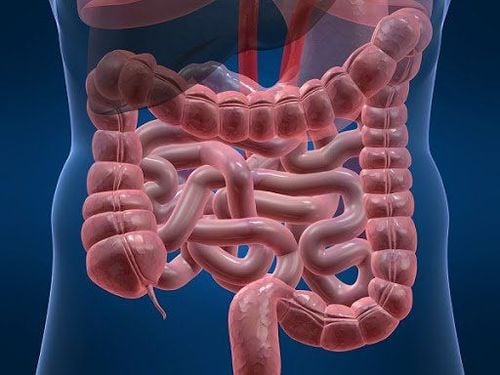This is an automatically translated article.
Posted by Master, Doctor Mai Vien Phuong - Department of Examination & Internal Medicine - Vinmec Central Park International General Hospital
Abdominal sounds, or bowel sounds, refer to noises made in the small and large intestines, usually during digestion. They are characterized by hollow sounds that can be similar to the sound of water moving through a pipe, sometimes described by patients as hearing a "tumble, gurgle" sound running through the abdomen.
1. Belly (gut) sounds
Bowel sounds are usually a most normal occurrence. However, unusually loud, frequent sounds, or a lack of abdominal sounds may indicate an underlying condition in the digestive system.
2. Symptoms of abdominal sounds
Belly sounds are sounds made by the intestines. They can be the following:
High pitched growl

3. Accompanying symptoms of abdominal sounds
Abdominal sounds alone are not usually a cause for concern. However, the presence of other symptoms accompanied by sounds may indicate an underlying disease. These symptoms may include:
Excess gas Fever Nausea Vomiting Frequent diarrhea Constipation Bloody stools Heartburn Unintentional and sudden weight loss Feelings of irritation Contact your doctor if you experiencing any of these symptoms or abdominal pain, helps you avoid possible serious complications.
4. Causes of abdominal sounds
The abdominal sounds you hear are most likely related to the movement of food, fluids, digestive juices and air through your intestines.
As your intestines process food, your stomach may growl or growl. When you eat, the vessel walls contract to mix and force the food through the intestines so it can be digested. This process is called peristalsis. Peristalsis is usually responsible for the rumbling sound you hear after eating. It can happen several hours after eating and even at night while you are sleeping.
Hunger can also cause abdominal sounds. According to an article published by the Endocrinology and Metabolism Clinic in North America, when you're hungry, hormone-like substances in the brain trigger the desire to eat, which then sends signals to the intestines and stomach. As a result, the muscles in your digestive system contract and cause these sounds.
Abdominal sounds can be classified as normal, inactive or hyperactive. Decreased or decreased bowel sounds usually indicate that bowel activity has slowed. On the other hand, a hyperactive bowel sound is a louder sound associated with increased bowel activity that can be heard by others. They usually happen after eating or when you have diarrhea.
Although infrequent decreased bowel sounds and hyperactivity are normal, frequent experience at either end of the spectrum and the presence of other abnormal symptoms may indicate a problem. medical topic.

5. Other causes
Most of the sounds you hear in your intestines are due to normal digestion, but abdominal sounds accompanying symptoms could be due to a more serious medical condition or the use of certain medications.
Hyperactivity, decreased activity or lack of bowel sounds can be caused by:
Trauma Infection in the digestive tract A hernia, which is when a part of an organ or pushes other tissue through a weak area of the intestines. the abdominal wall muscles A blood clot or low blood flow to the intestine Abnormal blood potassium levels Abnormal blood calcium levels A tumor Intestinal obstruction or blockage Temporarily slows down the movement of the intestines, or ileum Other causes of hyperactive bowel sounds are:
Bleeding ulcers Food allergies Infections leading to inflammation or diarrhea Use of laxatives Bleeding in the digestive tract Inflammatory bowel disease, especially Crohn's disease What causes it? Hypoechoic or no bowel sounds are:
Ulcers that cause perforation of the gastrointestinal tract Certain medications, such as codeine General anesthesia Abdominal surgery Radiation damage Bowel injury Partial or complete obstruction of Intestinal Infection of the abdominal cavity, or peritonitis
6. Abdominal sound test
If abnormal abdominal sounds occur along with other symptoms, your doctor will perform some tests to diagnose the underlying cause. Your doctor may start by reviewing your medical history and asking some questions about the frequency and severity of your symptoms. They will also use a stethoscope to listen for any abnormal bowel sounds. This step is called auscultation. Intestinal obstructions often produce very loud, high-pitched sounds. These sounds can often be heard without using a stethoscope.

Your doctor may also perform some tests:
A CT scan (tomography) is used to take X-ray pictures of the abdomen. A gastroscopy is a test that uses a camera attached to a small, flexible tube to take pictures of the stomach or intestines. Blood tests are used to rule out infection, inflammation, or organ damage.
7. Treatment of abdominal sounds
Treatment will depend on the cause of your symptoms. Normal bowel sounds do not require treatment. You may want to limit your intake of gas-producing foods. Includes:
Fruits Beans Artificial sweeteners Carbonated soft drinks Whole grain products Certain vegetables such as cabbage, Brussels sprouts and broccoli Avoid dairy if you are lactose intolerant.
Swallowing air by eating too quickly, drinking through a straw or chewing gum can also lead to excess air in your digestive tract.
Probiotics may be helpful with rumbling bowel sounds, but only in people who also have irritable bowel syndrome.
It's important to remember that most of these sounds can only be heard by you. Most others don't know about them or don't care.

8. Abdominal sounds and medical emergencies
If you have signs of a medical emergency, such as bleeding, bowel damage or a serious blockage, you need to be hospitalized for treatment. At the hospital, a tube may be placed through your mouth or nose and into your stomach or intestines to expel them. Usually, you won't be able to eat or drink anything afterwards to give your gut a rest.
For some people, receiving fluids intravenously and allowing the bowel system to rest will be enough to treat the problem. Others may need surgery. For example, if you have a serious infection or injury to your intestines, or if your intestines are completely blocked, you may need surgery to correct the problem and treat any damage.
Medicines are available for some gastrointestinal diseases such as Crohn's disease or ulcerative colitis. If you are diagnosed with one of these conditions, your doctor may prescribe medication for you.
9. Prospects for Belly Sound
The outlook for abdominal sounds depends on the severity of the problem. Usually, the sounds in your digestive system are normal and not a cause for concern. If your abdominal sounds seem abnormal or they are accompanied by other symptoms, see your doctor right away to reduce your risk of complications.
In rare cases, certain complications can be life-threatening if left untreated. In particular, intestinal obstructions can be dangerous. The blockage can lead to tissue death if it cuts off blood supply to part of your intestines. Any tear in the stomach or intestinal wall can lead to an infection in the abdominal cavity. This can cause death.
Other conditions and diseases such as tumors or Crohn's disease may require long-term treatment and monitoring.
Department of Endoscopy - Gastroenterology is one of the key specialties at Vinmec International General Hospital. For timely examination, advice and treatment of digestive diseases, you can contact Vinmec Health System nationwide or book an appointment on the website for service.
Please dial HOTLINE for more information or register for an appointment HERE. Download MyVinmec app to make appointments faster and to manage your bookings easily.














